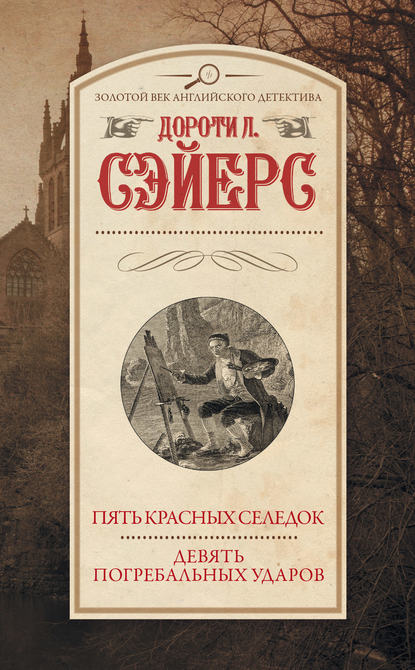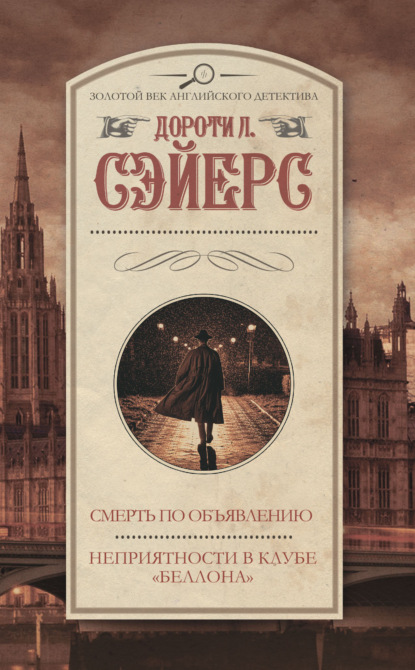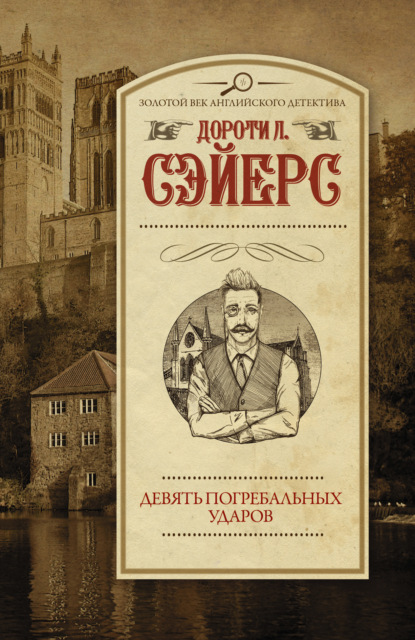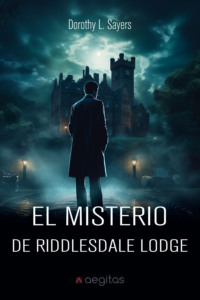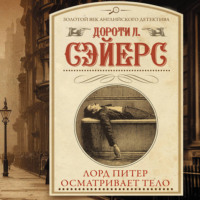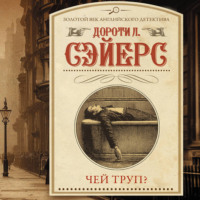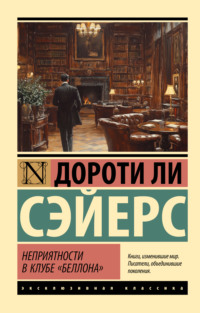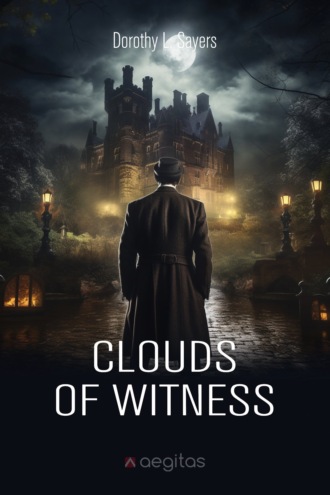
Полная версия
Clouds of Witness
The Coroner: "You were quite happy in your engagement?"
Witness: "Quite."
The Coroner: "You naturally saw a good deal of Captain Cathcart. Did he tell you much about his previous life?"
Witness: "Not very much. We were not given to mutual confidences. We usually discussed subjects of common interest."
The Coroner: "You had many such subjects?"
Witness: "Oh, yes."
The Coroner: "You never gathered at any time that Captain Cathcart had anything on his mind?"
Witness: "Not particularly. He had seemed a little anxious the last few days."
The Coroner: "Did he speak of his life in Paris?"
Witness: "He spoke of theatres and amusements there. He knew Paris very well. I was staying in Paris with some friends last February, when he was there, and he took us about. That was shortly after our engagement."
The Coroner: "Did he ever speak of playing cards in Paris?"
Witness: "I don't remember."
The Coroner: "With regard to your marriage-had any money settlements been gone into?"
Witness: "I don't think so. The date of the marriage was not in any way fixed."
The Coroner: "He always appeared to have plenty of money?"
Witness: "I suppose so; I didn't think about it."
The Coroner: "You never heard him complain of being hard up?"
Witness: "Everybody complains of that, don't they?"
The Coroner: "Was he a man of cheerful disposition?"
Witness: "He was very moody, never the same two days together."
The Coroner: "You have heard what your brother said. Did you hear someone run downstairs and bang the front door.
[Some garbled text removed here]
The next witness called was James Fleming, the manservant.
He remembered having brought the letters from Riddlesdale at 9.45 on Wednesday evening. He had taken three or four letters to the Duke in the gunroom.
He could not remember at all whether one of them had had an Egyptian stamp. He did not collect stamps; his hobby was autographs.
The Hon. Frederick Arbuthnot then gave evidence.
He had gone up to bed with the rest at a little before ten. He had heard Denver come up by himself some time later-couldn't say how much later-he was brushing his teeth at the time. (Laughter.) Had certainly heard loud voices and a row going on next door and in the passage. Had heard somebody go for the stairs hell-for-leather. Had stuck his head out and seen Denver in the passage. Had said, "Hello, Denver, what's the row?" The Duke's reply had been inaudible.
Denver had bolted into his bedroom and shouted out of the window, "Don't be an ass, man!"
He had seemed very angry indeed, but the Hon. Freddy attached no importance to that. One was always getting across Denver, but it never came to anything. More dust than kick in his opinion. Hadn't known Cathcart long-I always found him all right-no, he didn't like Cathcart, but he was all right, you know, nothing wrong about him that he knew of. Good lord, no, he'd never heard it suggested he cheated at cards! Well, no, of course, he didn't go about looking out for people cheating at cards-it wasn't a thing one expected. He'd been had that way in a club at Monte once-he'd had no hand in bringing it to light-hadn't noticed anything till the fun began. Had not noticed anything particular in Cathcart's manner to Lady Mary, or hers to him. Didn't suppose he ever would notice anything; did not consider himself an observing sort of man. Was not interfering by nature; had thought Wednesday evening's dustup none of his business. Had gone to bed and to sleep.
The Coroner: "Did you hear anything further that night?"
Hon. Frederick: "Not till poor little Mary knocked me up. Then I toddled down and found Denver in the conservatory, bathing Cathcart's head. We thought we ought to clean the gravel and mud off his face, you know."
The Coroner: "You heard no shot?"
Hon. Frederick: "Not a sound. But I sleep pretty heavily."
Colonel and Mrs. Marchbanks slept in the room over what was called the study-more a sort of smoking-room really. They both gave the same account of a conversation which they had had at 11.30. Mrs. Marchbanks had sat up to write some letters after the Colonel was in bed. They had heard voices and someone running about, but had paid no attention. It was not unusual for members of the party to shout and run about.
At last the Colonel had said, "Come to bed, my dear, it's half-past eleven, and we're making an early start tomorrow. You won't be fit for anything." He said this because Mrs. Marchbanks was a keen sportswoman and always carried her gun with the rest. She replied, "I'm just coming." The Colonel said, "You're the only sinner burning the midnight oil-everybody's turned in." Mrs. Marchbanks replied, "No, the Duke's still up; I can hear him moving about in the study." Colonel Marchbanks listened and heard it too. Neither of them heard the Duke come up again. They had heard no noise of any kind in the night.
Mr. Pettigrew-Robinson appeared to give evidence with extreme reluctance. He and his wife had gone to bed at ten. They had heard the quarrel with Cathcart. Mr. Pettigrew-Robinson, fearing that something might be going to happen, opened his door in time to hear the Duke say, "If you dare to speak to my sister again I'll break every bone in your body," or words to that effect.
Cathcart had rushed downstairs. The Duke was scarlet in the face. He had not seen Mr. Pettigrew-Robinson, but had spoken a few words to Mr. Arbuthnot and rushed into his own bedroom. Mr. Pettigrew-Robinson had run out, and said to Mr. Arbuthnot, "I say, Arbuthnot," and Mr. Arbuthnot had very rudely slammed the door in his face. He had then gone to the Duke's door and said, "I say, Denver." The Duke had come out, pushing past him, without even noticing him, and gone to the head of the stairs. He had heard him tell Fleming to leave the conservatory door open, as Mr. Cathcart had gone out. The Duke had then returned.
Mr. Pettigrew-Robinson had tried to catch him as he passed, and had said again, "I say, Denver, what's up?" The Duke had said nothing, and had shut his bedroom door with great decision. Later on, however, at 11.30 to be precise, Mr. Pettigrew-Robinson had heard the Duke's door open, and stealthy feet moving about the passage. He could not hear whether they had gone downstairs. The bathroom and lavatory were at his end of the passage, and, if anybody had entered either of them, he thought he should have heard. He had not heard the footsteps return. He had heard his travelling clock strike twelve before falling asleep. There was no mistaking the Duke's bedroom door, as the hinge creaked in a peculiar manner.
Mrs. Pettigrew-Robinson confirmed her husband's evidence. She had fallen asleep before midnight, and had slept heavily. She was a heavy sleeper at the beginning of the night, but slept lightly in the early morning.
She had been annoyed by all the disturbance in the house that evening, as it had prevented her from getting off. In fact, she had dropped off about 10.30, and Mr. Pettigrew-Robinson had had to wake her an hour after to tell her about the footsteps. What with one thing and another she only got a couple of hours' good sleep.
She woke up again at two, and remained broad awake till the alarm was given by Lady Mary. She could swear positively that she heard no shot in the night. Her window was next to Lady Mary's, on the opposite side from the conservatory. She had always been accustomed from a child to sleep with her window open. In reply to a question from the Coroner, Mrs. Pettigrew-Robinson said she had never felt there was a real, true affection between Lady Mary Wimsey and deceased.
They seemed very off-hand, but that sort of thing was the fashion nowadays. She had never heard of any disagreement.
Miss Lydia Cathcart, who had been hurriedly summoned from town, then gave evidence about the deceased man. She told the Coroner that she was the Captain's aunt and his only surviving relative. She had seen very little of him since he came into possession of his father's money. He had always lived with his own friends in Paris, and they were such as she could not approve of.
"My brother and I never got on very well," said Miss Cathcart, "and he had my nephew educated abroad. He was eighteen and I fear Denis's notions were always quite French. After my brother's death Denis went to Cambridge, by his father's desire. I was left executrix of the will, and guardian till Denis came of age. I do not know why, after neglecting me all his life, my brother should have chosen to put such a responsibility upon me at his death, but I did not care to refuse. My house was open to Denis during his holidays from college, but he preferred, as a rule, to go and stay with his rich friends. I cannot now recall any of their names. When Denis was twenty-one he came into [missing] 10,000 a year. I believe it was in some kind of foreign property. I inherited a certain amount under the will as executrix, but I converted it all, at once, into good, sound, British securities. I cannot say what Denis did with his. It would not surprise me at all to hear that he had been cheating at cards. I have heard that the persons he consorted with in Paris were most undesirable. I never met any of them. I have never been in France."
John Hardraw, the gamekeeper, was next called. He and his wife inhabit a small cottage just inside the gate of Riddlesdale Lodge. The grounds, which measure twenty acres or so, are surrounded at this point by a strong paling; the gate is locked at night. Hardraw stated that he had heard a shot fired at about ten minutes to twelve on Wednesday night, close to the cottage, as it seemed to him. Behind the cottage are ten acres of preserved plantation. He supposed that there were poachers about; they occasionally came in after hares. He went out with his gun in that direction, but saw nobody. He returned home at one o'clock by his watch.
The Coroner: "Did you fire your gun at any time?"
Witness: "No."
The Coroner: "You did not go out again?"
Witness: "I did not."
The Coroner: "Nor hear any other shots?"
Witness: "Only that one; but I fell asleep after I got back, and was wakened up by the chauffeur going out for the doctor. That would be at about a quarter past three."
The Coroner: "Is it not unusual for poachers to shoot so very near the cottage?"
Witness: "Yes, rather. If poachers do come, it is usually on the other side of the preserve, towards the moor."
Dr. Thorpe gave evidence of having been called to see deceased. He lived in Stapley, nearly fourteen miles from Riddlesdale. There was no medical man in Riddlesdale. The chauffeur had knocked him up at 3.45 A.M., and he had dressed quickly and come with him at once. They were at Riddlesdale Lodge at half-past four. Deceased, when he saw him, he judged to have been dead three or four hours. The lungs had been pierced by a bullet, and death had resulted from loss of blood, and suffocation. Death would not have resulted immediately-deceased might have lingered some time.
He had made a post-mortem investigation, and found that the bullet had been deflected from a rib. There was nothing to show whether the wound had been self-inflicted or fired from another hand, at close quarters.
There were no other marks of violence.
Inspector Craikes from Stapley had been brought back in the car with Dr. Thorpe. He had seen the body.
It was then lying on its back, between the door of the conservatory and the covered well just outside. As soon as it became light, Inspector Craikes had examined the house and grounds. He had found bloody marks all along the path leading to the conservatory, and signs as though a body had been dragged along. This path ran to the main path leading from the gate to the front door. (Plan produced.) Where the two paths joined shrubbery began, and ran down on both sides of the path to the gate and the gamekeeper's cottage. The blood-tracks had led to a little clearing in the middle of the shrubbery, about half-way between the house and the gate. Here the inspector found a great pool of blood, a handkerchief soaked in blood, and a revolver.
The handkerchief bore the initials D.C., and the revolver was a small weapon of American pattern, and bore no mark. The conservatory door was open when the Inspector arrived, and the key was inside.
Deceased, when he saw him, was in dinner-jacket and pumps, without hat or overcoat. He was wet through, and his clothes, besides being much blood-stained, were very muddy and greatly disordered through the dragging of the body. The pocket contained a cigar-case and a small, flat pocket-knife. Deceased's bedroom had been searched for papers, etc., but so far nothing had been found to shed very much light on his circumstances.
The Duke of Denver was then recalled.
The Coroner: "I should like to ask your grace whether you ever saw deceased in possession of a revolver?"
Duke of D.: "Not since the war."
The Coroner: "You do not know if he carried one about with him?"
Duke of D.: "I have no idea."
The Coroner: "You can make no guess, I suppose, to whom this revolver belongs?"
Duke of D. (in great surprise): "That's my revolver-out of the study table drawer. How did you get hold of that?" – (Sensation.)
The Coroner: "You are certain?"
Duke of D.: "Positive. I saw it there only the other day when I was hunting out some photos of Mary for Cathcart, and I remember saying then that it was getting rusty lying about. There's the speck of rust."
The Coroner: "Did you keep it loaded?"
Duke of D.: "Lord, no! I really don't know why it was there. I fancy I turned it out one day with some old Army stuff, and found it among my shooting things when I was up at Riddlesdale in August. I think the cartridges were with it."
The Coroner: "Was the drawer locked?"
Duke of D.: "Yes; but the key was in the lock. My wife tells me I'm careless."
The Coroner: "Did anybody else know the revolver was there?"
Duke of D.: "Fleming did, I think. I don't know of anybody else."
Detective-Inspector Parker of Scotland Yard, having only arrived on Friday, had been unable as yet to make any very close investigation. Certain indications led him to think that some person or persons had been on the scene of the tragedy in addition to those who had taken part in the discovery. He preferred to say nothing more at present.
The Coroner then reconstructed the evidence in chronological order. At, or a little after, ten o'clock there had been a quarrel between deceased and the Duke of Denver, after which deceased had left the house never to be seen alive again. They had the evidence of Mr. Pettigrew-Robinson that the Duke had gone downstairs at 11.30, and that of Colonel Marchbanks that he had been heard immediately afterwards moving about the study, the room in which the revolver produced in evidence was usually kept. Against this they had the Duke's own sworn statement that he had not left his bedroom till half-past two in the morning. The jury would have to consider what weight was to be attached to those conflicting statements. Then, as to the shots heard in the night; the gamekeeper had said he heard a shot at ten minutes to twelve, but he had supposed it to be fired by poachers. It was, in fact, quite possible that there had been poachers about. On the other hand, Lady Mary's statement that she had heard the shot at about three A.M. did not fit in very well with the doctor's evidence that when he arrived at Riddlesdale at 4.30 deceased had been already three or four hours dead.
They would remember also that, in Dr. Thorpe's opinion, death had not immediately followed the wound. If they believed this evidence, therefore, they would have to put back the moment of death to between eleven P.M. and midnight, and this might very well have been the shot which the gamekeeper heard. In that case they had still to ask themselves about the shot which had awakened Lady Mary Wimsey. Of course, if they liked to put that down to poachers, there was no inherent impossibility.
They next came to the body of deceased, which had been discovered by the Duke of Denver at three A.M. lying outside the door of the small conservatory, near the covered well. There seemed little doubt, from the medical evidence, that the shot which killed deceased had been fired in the shrubbery, about seven minutes' distance from the house, and that the body of deceased had been dragged from that place to the house. Deceased had undoubtedly died as the result of being shot in the lungs. The jury would have to decide whether that shot was fired by his own hand or by the hand of another and, if the latter, whether by accident, in self-defence or by malice aforethought with intent to murder.
As regards suicide, they must consider what they knew of deceased's character and circumstances. Deceased was a young man in the prime of his strength, and apparently of considerable fortune. He had had a meritorious military career, and was liked by his friends. The Duke of Denver had thought sufficiently well of him to consent to his own sister's engagement to deceased. There was evidence to show that the fiancés, though perhaps not demonstrative, were on excellent terms. The Duke affirmed that on the Wednesday night deceased had announced his intention of breaking off the engagement. Did they believe that deceased, without even communicating with the lady, or writing a word of explanation or farewell, would thereupon rush out and shoot himself? Again, the jury must consider the accusation which the Duke of Denver said he had brought against deceased. He had accused him of cheating at cards. In the kind of society to which the persons involved in this inquiry belonged, such a misdemeanour as cheating at cards was regarded as far more shameful than such sins as murder and adultery.
Possibly the mere suggestion of such a thing, whether well-founded or not, might well cause a gentleman of sensitive honour to make away with himself. But was deceased honourable? Deceased had been educated in France, and French notions of the honest thing were very different from British ones. The Coroner himself had had business relations with French persons in his capacity as a solicitor, and could assure such of the jury as had never been in France that they ought to allow for these different standards. Unhappily, the alleged letter giving details of the accusation had not been produced to them. Next, they might ask themselves whether it was not more usual for a suicide to shoot himself in the head. They should ask themselves how deceased came by the revolver. And, finally, they must consider, in that case, who had dragged the body towards the house and why the person had chosen to do so, with great labour to himself and at the risk of extinguishing any lingering remnant of the vital spark, instead of arousing the household and fetching help.
If they excluded suicide, there remained accident, manslaughter, or murder. As to the first, if they thought it likely that deceased or any other person had taken out the Duke of Denver's revolver that night for any purpose, and that, in looking at, cleaning, shooting with, or otherwise handling the weapon, it had gone off and killed deceased accidentally, then they would return a verdict of death by misadventure accordingly. In that case, how did they explain the conduct of the person, whoever it was, who had dragged the body to the door?
The Coroner then passed on to speak of the law concerning manslaughter. He reminded them that no mere words, however insulting or threatening, can be an efficient excuse for killing anybody, and that the conflict must be sudden and unpremeditated. Did they think, for example, that the Duke had gone out, wishing to induce his guest to return and sleep in the house, and that deceased had retorted upon him with blows or menaces of assault? If so, and the Duke, having a weapon in his hand, had shot deceased in self-defence, that was only manslaughter. But, in that case, they must ask themselves how the Duke came to go out to deceased with a lethal weapon in his hand? And this suggestion was in direct conflict with the Duke's own evidence.
Lastly they must consider whether there was sufficient evidence of malice to justify a verdict of murder. They must consider whether any person had a motive, means and opportunity for killing deceased; and whether they could reasonably account for that person's conduct on any other hypothesis. And, if they thought there was such a person, and that his conduct was in any way suspicious or secretive, or that he had wilfully suppressed evidence which might have had a bearing on the case, or (here the Coroner spoke with great emphasis, staring over the Duke's head) fabricated other evidence with intent to mislead-then all these circumstances might be sufficient to amount to a violent presumption of guilt against some party, in which case they were in duty bound to bring in a verdict of wilful murder against that party. And, in considering this aspect of the question, the Coroner added, they would have to decide in their own minds whether the person who had dragged deceased towards the conservatory door had done so with the object of obtaining assistance or of thrusting the body down the garden well, which, as they had heard from Inspector Craikes, was situate close by the spot where the body had been found. If the jury were satisfied that deceased had been murdered, but were not prepared to accuse any particular person on the evidence, they might bring in a verdict of murder against an unknown person, or persons; but, if they felt justified in laying the killing at any person's door, then they must allow no respect of persons to prevent them from doing their duty.
Guided by these extremely plain hints, the jury, without very long consultation, returned a verdict of wilful murder against Gerald, Duke of Denver.
Chapter II
The Green-Eyed Cat
"And here's to the hound
With his nose unto the ground-"
Drink, Puppy, DrinkSome people hold that breakfast is the best meal of the day. Others, less robust, hold that it is the worst, and that, of all breakfasts in the week, Sunday-morning breakfast is incomparably the worst.
The party gathered about the breakfast-table at Riddlesdale Lodge held, if one might judge from their faces, no brief for that day miscalled of sweet refection and holy love. The only member of it who seemed neither angry nor embarrassed was the Hon. Freddy Arbuthnot, and he was silent, engaged in trying to take the whole skeleton out of a bloater at once. The very presence of that undistinguished fish upon the Duchess's breakfast-table indicated a disorganised household.
The Duchess of Denver was pouring out coffee. This was one of her uncomfortable habits. Persons arriving late for breakfast were thereby made painfully aware of their sloth. She was a long-necked, long-backed woman, who disciplined her hair and her children. She was never embarrassed, and her anger, though never permitted to be visible, made itself felt the more.
Colonel and Mrs. Marchbanks sat side by side. They had nothing beautiful about them but a stolid mutual affection. Mrs. Marchbanks was not angry, but she was embarrassed in the presence of the Duchess, because she could not feel sorry for her. When you felt sorry for people you called them "poor old dear" or "poor dear old man." Since, obviously, you could not call the Duchess poor old dear, you were not being properly sorry for her. This distressed Mrs. Marchbanks. The Colonel was both embarrassed and angry-embarrassed because, 'pon my soul, it was very difficult to know what to talk about in a house where your host had been arrested for murder; angry in a dim way, like an injured animal, because unpleasant things like this had no business to break in on the shooting-season.
Mrs. Pettigrew-Robinson was not only angry, she was outraged. As a girl she had adopted the motto stamped upon the school notepaper: Quecunque honesta. She had always thought it wrong to let your mind dwell on anything that was not really nice. In middle life she still made a point of ignoring those newspaper paragraphs which bore such headlines as: "ASSAULT UPON A SCHOOLTEACHER AT CRICKLEWOOD"; "DEATH IN A PINT OF STOUT"; "FOR A KISS"; or "SHE CALLED HIM HUBBYKINS." She said she could not see what good it did you to know about such things. She regretted having consented to visit Riddlesdale Lodge in the absence of the Duchess. She had never liked Lady Mary; she considered her a very objectionable specimen of the modern independent young woman; besides, there had been that very undignified incident connected with a Bolshevist while Lady Mary was nursing in London during the war. Nor had Mrs. Pettigrew-Robinson at all cared for Captain Denis Cathcart. She did not like a young man to be handsome in that obvious kind of way. But, of course, since Mr. Pettigrew-Robinson had wanted to come to Riddlesdale, it was her place to be with him. She was not to blame for the unfortunate result.


